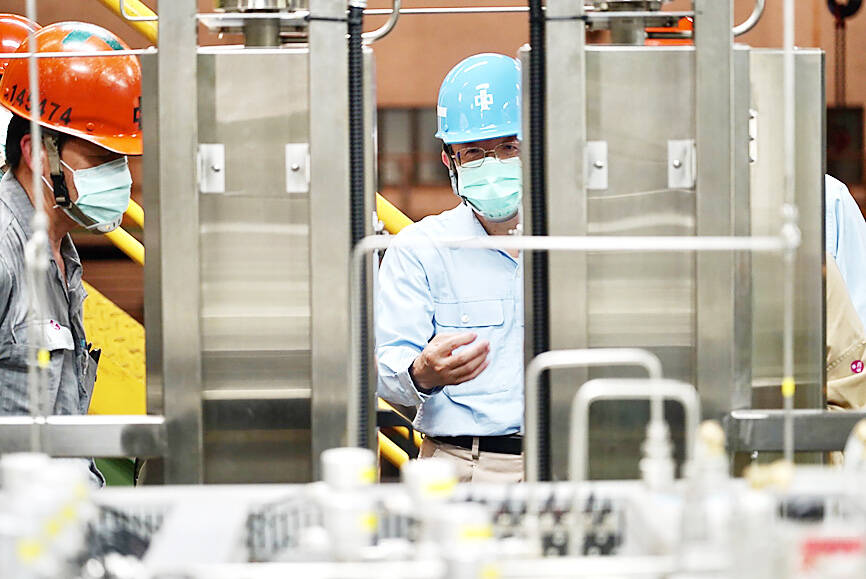China Steel Corp (中鋼) yesterday said it would raise the prices of hot-rolled plate and cold-rolled coils, which are commonly used in construction and auto manufacturing, by NT$500 per tonne for domestic deliveries next month, ending a three-month streak of price cuts.
Other steel products used in home appliances, computers and other applications would be flat, the company said in a statement.
Overall next quarter, steel prices for domestic deliveries would dip 0.83 percent on average sequentially, or a decline of NT$500 to NT$1,500 per tonne, due to inventory correction, the steelmaker said.

Photo: CNA
The Kaohsiung-based company said it took its cue from global peers, which have raised steel prices amid an improving industry outlook.
The global steel industry is on track to recover as China ditches its “zero COVID” policy and adopts new economic stimulus measures, including new investments on infrastructure, to help stimulate consumption and its economy, the company said.
An easing of the auto chip shortage has also led to an improvement in global auto sales, China Steel said in a statement.
Global supply has been falling, with crude steel production falling 3.9 percent year-on-year in the first 10 months of this year as steelmakers in the US and Europe stepped up output cuts, China Steel said, citing statistics from the World Steel Association.
China, which accounts for about half of the world’s apparent steel consumption, saw its steel inventory plunge 50 percent from this year’s peak, dropping to its lowest level in three years, the company said.
“That indicates inventory digestion in the world steel industry is nearing an end,” it said.
As the prices of iron ore and other commodities continue to hover at high levels, they have lent support to global steel prices, China Steel said.
“It is clear that global steel prices have hit the bottom and are ready to rebound,” it said.
Responding to improving market conditions, China’s major steelmakers started hiking hot-rolled steel for exports by US$30 per tonne, China Steel said.
Baowu Steel Group Ltd (寶武鋼鐵), the world’s biggest steelmaker, and Angang Steel Co (鞍山鋼鐵) have raised price quotes for some steel deliveries domestically next month by 50 yuan to 300 yuan (US$7.20 to US$43) per tonne, China Steel said.
US steelmakers took the lead by raising steel prices by US$66 per tonne last month and they are working on a second round of price increases, the company said.
European steelmakers are following suit and plan to increase prices by US$85 per tonne for deliveries in the first quarter, China Steel said.

Vincent Wei led fellow Singaporean farmers around an empty Malaysian plot, laying out plans for a greenhouse and rows of leafy vegetables. What he pitched was not just space for crops, but a lifeline for growers struggling to make ends meet in a city-state with high prices and little vacant land. The future agriculture hub is part of a joint special economic zone launched last year by the two neighbors, expected to cost US$123 million and produce 10,000 tonnes of fresh produce annually. It is attracting Singaporean farmers with promises of cheaper land, labor and energy just over the border.

US actor Matthew McConaughey has filed recordings of his image and voice with US patent authorities to protect them from unauthorized usage by artificial intelligence (AI) platforms, a representative said earlier this week. Several video clips and audio recordings were registered by the commercial arm of the Just Keep Livin’ Foundation, a non-profit created by the Oscar-winning actor and his wife, Camila, according to the US Patent and Trademark Office database. Many artists are increasingly concerned about the uncontrolled use of their image via generative AI since the rollout of ChatGPT and other AI-powered tools. Several US states have adopted

KEEPING UP: The acquisition of a cleanroom in Taiwan would enable Micron to increase production in a market where demand continues to outpace supply, a Micron official said Micron Technology Inc has signed a letter of intent to buy a fabrication site in Taiwan from Powerchip Semiconductor Manufacturing Corp (力積電) for US$1.8 billion to expand its production of memory chips. Micron would take control of the P5 site in Miaoli County’s Tongluo Township (銅鑼) and plans to ramp up DRAM production in phases after the transaction closes in the second quarter, the company said in a statement on Saturday. The acquisition includes an existing 12 inch fab cleanroom of 27,871m2 and would further position Micron to address growing global demand for memory solutions, the company said. Micron expects the transaction to

A proposed billionaires’ tax in California has ignited a political uproar in Silicon Valley, with tech titans threatening to leave the state while California Governor Gavin Newsom of the Democratic Party maneuvers to defeat a levy that he fears would lead to an exodus of wealth. A technology mecca, California has more billionaires than any other US state — a few hundred, by some estimates. About half its personal income tax revenue, a financial backbone in the nearly US$350 billion budget, comes from the top 1 percent of earners. A large healthcare union is attempting to place a proposal before